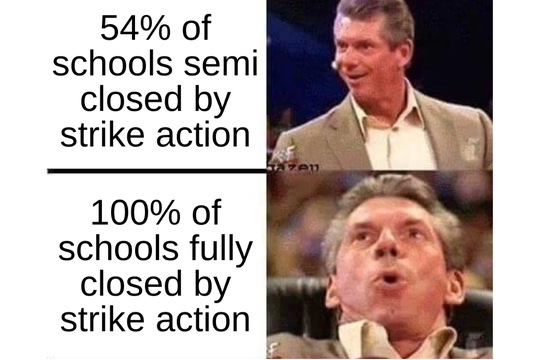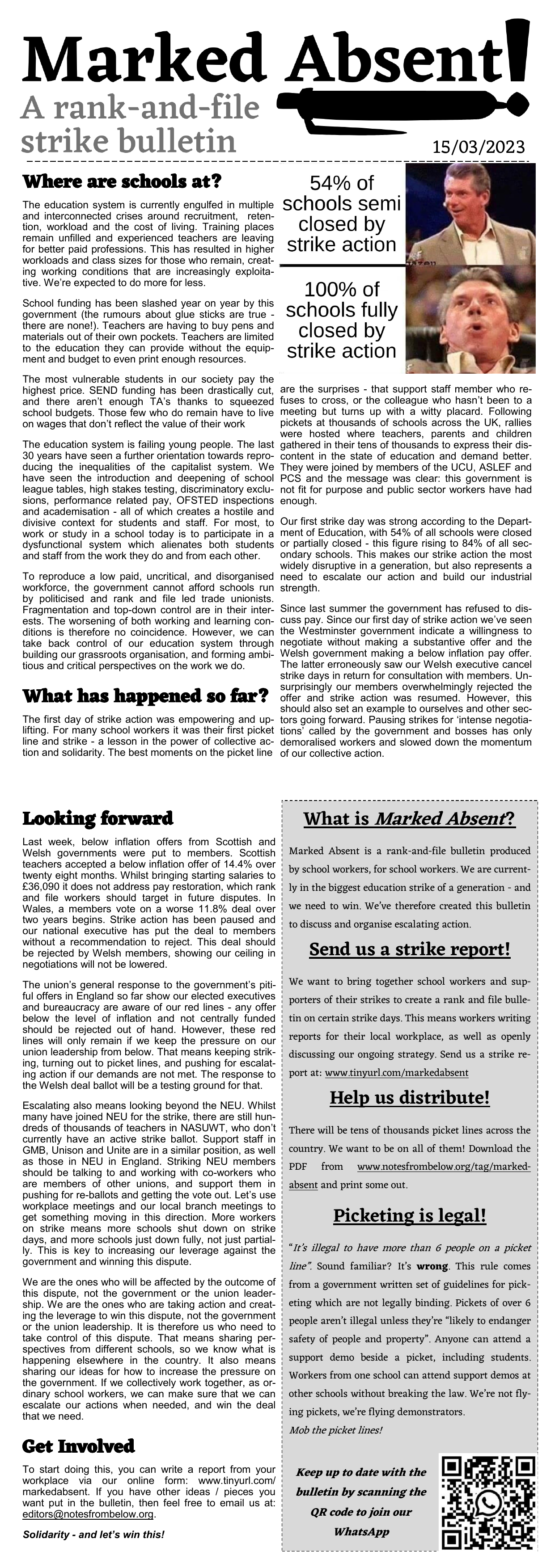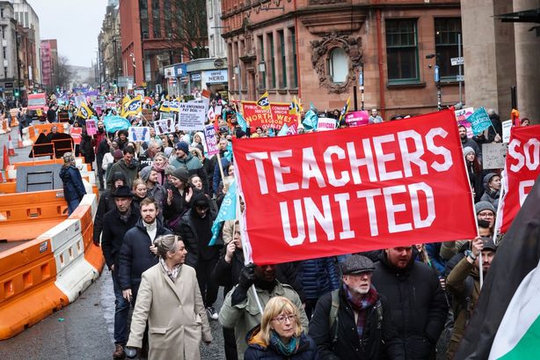Marked Absent! - 15th March Strike
by
Marked Absent
March 13, 2023
The first of a new rank-and-file bulletin - by school workers, for school workers.

bulletins
Marked Absent! - 15th March Strike
by
Marked Absent
/
March 13, 2023
The first of a new rank-and-file bulletin - by school workers, for school workers.
Marked Absent is a rank-and-file bulletin made by school workers, for school workers. This is the first bulletin, for the Wednesday 15th March national school strike in England. You can read our launch statement here.
We encourage workers to share their own reports from the picket lines, by filling out the form here.
You can also join the WhatsApp announcement group by clicking here.
We encourage people to print copies out and hand them out at your school picket line! Below you can find a downloadable pdf to print off, followed by the bulletin in article form. Solidarity!

Where are we at?
The education system is currently engulfed in multiple and interconnected crises around recruitment, retention, workload and the cost of living. Training places remain unfilled and experienced teachers are leaving for better paid professions. This has resulted in higher workloads and class sizes for those who remain, creating working conditions that are increasingly exploitative. We’re expected to do more for less.
School funding has been slashed year on year by this government (the rumours about glue sticks are true - there are none!). Teachers are having to buy pens and materials out of their own pockets. Teachers are limited to the education they can provide without the equipment and budget to even print enough resources.
The most vulnerable students in our society pay the highest price. SEND funding has been drastically cut, and there aren’t enough TA’s thanks to squeezed school budgets. Those few who do remain have to live on wages that don’t reflect the value of their work.
The education system is failing young people. The last 30 years have seen a further orientation towards reproducing the inequalities of the capitalist system. We have seen the introduction and deepening of school league tables, high stakes testing, discriminatory exclusions, performance related pay, OFSTED inspections and academisation - all of which creates a hostile and divisive context for students and staff. For most, to work or study in a school today is to participate in a dysfunctional system which alienates both students and staff from the work they do and from each other.
To reproduce a low paid, uncritical, and disorganised workforce, the government cannot afford schools run by politicised and rank and file led trade unionists. Fragmentation and top-down control are in their interests. The worsening of both working and learning conditions is therefore no coincidence. However, we can take back control of our education system through building our grassroots organisation, and forming ambitious and critical perspectives on the work we do.
What has happened so far?
The first day of strike action was empowering and uplifting. For many school workers it was their first picket line and strike - a lesson in the power of collective action and solidarity. The best moments on the picket line are the surprises - that support staff member who refuses to cross, or the colleague who hasn’t been to a meeting but turns up with a witty placard. Following pickets at thousands of schools across the UK, rallies were hosted where teachers, parents and children gathered in their tens of thousands to express their discontent in the state of education and demand better. They were joined by members of the UCU, ASLEF and PCS and the message was clear: this government is not fit for purpose and public sector workers have had enough.
Our first strike day was strong according to the Department of Education, with 54% of all schools were closed or partially closed - this figure rising to 84% of all secondary schools. This makes our strike action the most widely disruptive in a generation, but also represents a need to escalate our action and build our industrial strength.
Since last summer the government has refused to discuss pay. Since our first day of strike action we’ve seen the Westminster government indicate a willingness to negotiate without making a substantive offer and the Welsh government making a below inflation pay offer. The latter erroneously saw our Welsh executive cancel strike days in return for consultation with members. Unsurprisingly our members overwhelmingly rejected the offer and strike action was resumed. However, this should also set an example to ourselves and other sectors going forward. Pausing strikes for ‘intense negotiations’ called by the government and bosses has only demoralised workers and slowed down the momentum of our collective action.
Looking forward
Last week, below inflation offers from Scottish and Welsh governments were put to members. Scottish teachers accepted a below inflation offer of 14.4% over twenty eight months. Whilst bringing starting salaries to £36,090 it does not address pay restoration, which rank and file workers should target in future disputes. In Wales, a members vote on a worse 11.8% deal over two years begins. Strike action has been paused and our national executive has put the deal to members without a recommendation to reject. This deal should be rejected by Welsh members, showing our ceiling in negotiations will not be lowered.
The union’s general response to the government’s pitiful offers in England so far show our elected executives and bureaucracy are aware of our red lines - any offer below the level of inflation and not centrally funded should be rejected out of hand. However, these red lines will only remain if we keep the pressure on our union leadership from below. That means keeping striking, turning out to picket lines, and pushing for escalating action if our demands are not met. The response to the Welsh deal ballot will be a testing ground for that.
Escalating also means looking beyond the NEU. Whilst many have joined NEU for the strike, there are still hundreds of thousands of teachers in NASUWT, who don’t currently have an active strike ballot. Support staff in GMB, Unison and Unite are in a similar position, as well as those in NEU in England. Striking NEU members should be talking to and working with co-workers who are members of other unions, and support them in pushing for re-ballots and getting the vote out. Let’s use workplace meetings and our local branch meetings to get something moving in this direction. More workers on strike means more schools shut down on strike days, and more schools just down fully, not just partially. This is key to increasing our leverage against the government and winning this dispute.
We are the ones who will be affected by the outcome of this dispute, not the government or the union leadership. We are the ones who are taking action and creating the leverage to win this dispute, not the government or the union leadership. It is therefore us who need to take control of this dispute. That means sharing perspectives from different schools, so we know what is happening elsewhere in the country. It also means sharing our ideas for how to increase the pressure on the government. If we collectively work together, as ordinary school workers, we can make sure that we can escalate our actions when needed, and win the deal that we need.
Get Involved
To start doing this, you can write a report from your workplace via our online form: www.tinyurl.com/markedabsent.
If you have other ideas / pieces you want put in the bulletin, then feel free to email: [email protected].
Solidarity - and let’s win this!
author
Marked Absent
Subscribe to Notes from Below
Subscribe now to Notes from Below, and get our print issues sent to your front door three times a year. For every subscriber, we’re also able to print a load of free copies to hand out in workplaces, neighbourhoods, prisons and picket lines. Can you subscribe now and support us in spreading Marxist ideas in the workplace?
Read next

A Bulletin for School Workers
by
Marked Absent
/
Feb. 24, 2023

